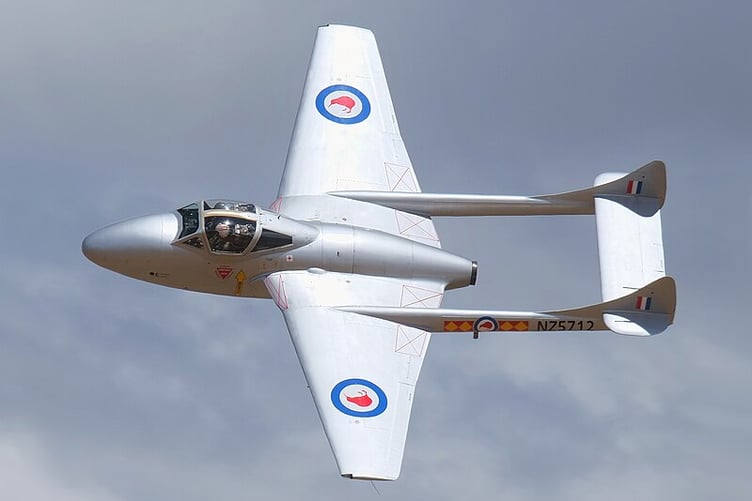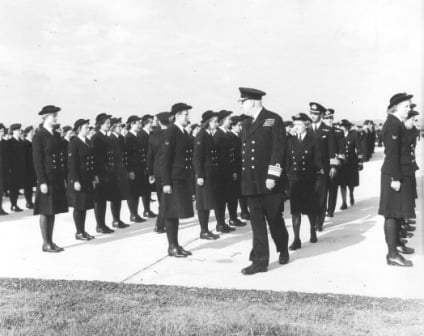Leading Wren Kathleen Oates’ life – and that of the Ronaldsway base - was ambling on as normal once more, 80 years ago this week, after the recent dramas of both TB and sea lice at close quarters. The danger of TB had not completely disappeared, however: ‘there really seems to be an awful lot of TB be about. I’ve heard of two more cases on Scarlett camp.’.
There had been the November 11 commemoration, which must have been both poignant and special, being the first after the end of the War – but Kathleen’s letter did not really reflect that. ‘I should have liked to have heard the Armistice broadcast from the Albert Hall. We had the usual Divisions, with a slightly different service. All the Wrens were wearing poppies in their caps which looked quite attractive.’
The weather would have been dampening outdoor activities – but Kathleen was fascinated to experience what it looked like on the new technology of radar. ‘I’m afraid the nice November weather which I’ve been telling you about has rather let me down. Today [Monday 12] it has poured down all day! This morning, I watched the storm get nearer and nearer on the radar plot: it was very interesting. It stretched between 290° and 210° on the west of the island and gradually drew nearer – till at lunchtime when I cycled to town, it was pouring!’
Although bicycle rides were on hold, the indoor social life of the Base continued. Happily, November 12 was also the day for Cabin K’s “social”. ‘Each Cabin takes it in turn to give it. We were very busy all afternoon. I helped in the galley – decorating 200 bridge rolls with various concoctions. The PO [Petty Officer] cook who’s in our Cabin, made delicious cakes and tarts. Half the Cabin decorated the Rec room with flags and bunting till it looked quite festive. It was a definite success, and soon got going. We all went in civvies – Jane wore my red and beige floral dress and I wore my blue dress which is very much admired.’
Happily, the distraction of more intellectual social pastimes was interspersed with work. ‘I went to the music circle on Tuesday [November 13]; there was night flying Monday; tonight, Thursday, I’ll be going to Christian Fellowship and Friday night [November 16], I’m on duty again if the weather is suitable.’
And there was always the cinema, which actually was frequently mentioned and discussed in detail in Kathleen’s letters, but which has not been reported much, since the titles and plots would be all but meaningless to most, eighty years on. Kathleen saw “Mr Skeffington” the previous Saturday in Port Erin and went to Douglas on Tuesday 13th for “Perfect Strangers”, which she described as ‘the “Navy” picture’. She was pleased at how accurately it reflected Navy life, and instructed her family on what to look out for when they went to see it. ‘Perfect Strangers stars Deborah Kerr as the Wren and Robert Donat as a Petty Officer. There’s one scene in a Wren’s Cabin which is very similar to our Nissen Hut – though we have more living space. Note the bunks and Naval ‘anchor’ coverlets – the hanging curtains which are our wardrobes - and the stove, which is exactly the same as ours. Note also how confused Donat is by the various ‘pipes’ when he first joins – ‘pipe down’, ‘wakey wakey’ etc. – just what we have.’
In an earlier letter that Autumn, Kathleen had commented on the film, “The Affairs of Susan”, where in the newsreel, she saw ‘a close-up of the “Vampire”; the take-off and shots of it flying over London. It doesn’t look as impressive on the film though, as it actually was.’. From her confident commentary, it is to be understood that she had seen one of these planes at Ronaldsway. The de Havilland Vampire was the first jet plane to cross the Atlantic and was the first RAF fighter with a speed exceeding 500mph.

Now that Britain was no longer at war, there was time to consider moral aspects. Presumably in answer to a speech her parents heard in church, Kathleen commented, ‘I was interested in the Provost’s remarks on the atomic bomb. I don’t know really what I think on the moral side of the subject. I expect if we hadn’t discovered and used the atomic bomb in this war, that it would be used by one side or the other in the next.’
And as ever, the knowledge that a unique period of time would soon come to an end, was reflected in that week’s letters. ‘I’ve seen the Wren Officer concerned this afternoon and she says that I definitely shan’t be demobbed directly from here. I shan’t have to re-muster, but just wait until I’m demobbed. What will happen in that interval of time I really can’t say. I expect I’ll have some work to do - and it may be absolutely anything! I’ve even heard of Wrens doing laundering in hospitals.’
This focused Kathleen’s practical mind on the pecuniary positives of an Isle of Man posting. Although she didn’t need another perm, her last one having only been in March, such hair treatment was so expensive on the mainland that she wondered if she should have it while still on the island, in the interests of economy.
More happily, personnel departures from Ronaldsway were accompanied by a fun send-.off. ‘Yesterday [November 15] was Wendy‘s last time in the Cabin – she is a galley steward. She had a compassionate draft to Liverpool, her home. We had a farewell lunch at the CKR in Castletown before going onto Douglas. A perfectly lovely meal for 2/6d each – you couldn’t have better cooking!’ At least some consolation was to be had among the goodbyes.

.jpeg?width=209&height=140&crop=209:145,smart&quality=75)
.jpeg?width=209&height=140&crop=209:145,smart&quality=75)
.png?width=209&height=140&crop=209:145,smart&quality=75)
.png?width=209&height=140&crop=209:145,smart&quality=75)